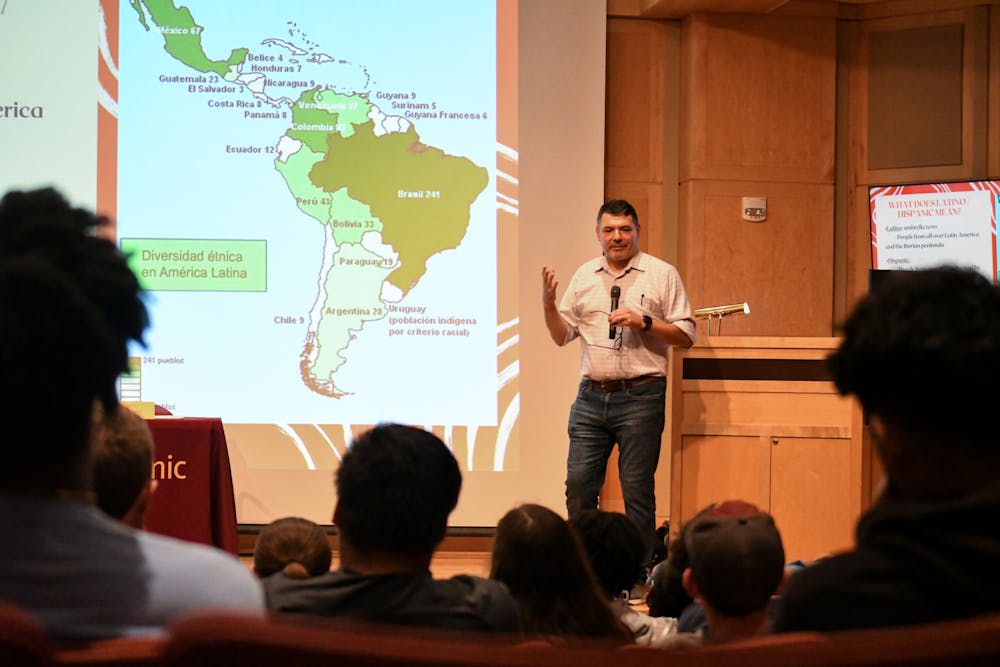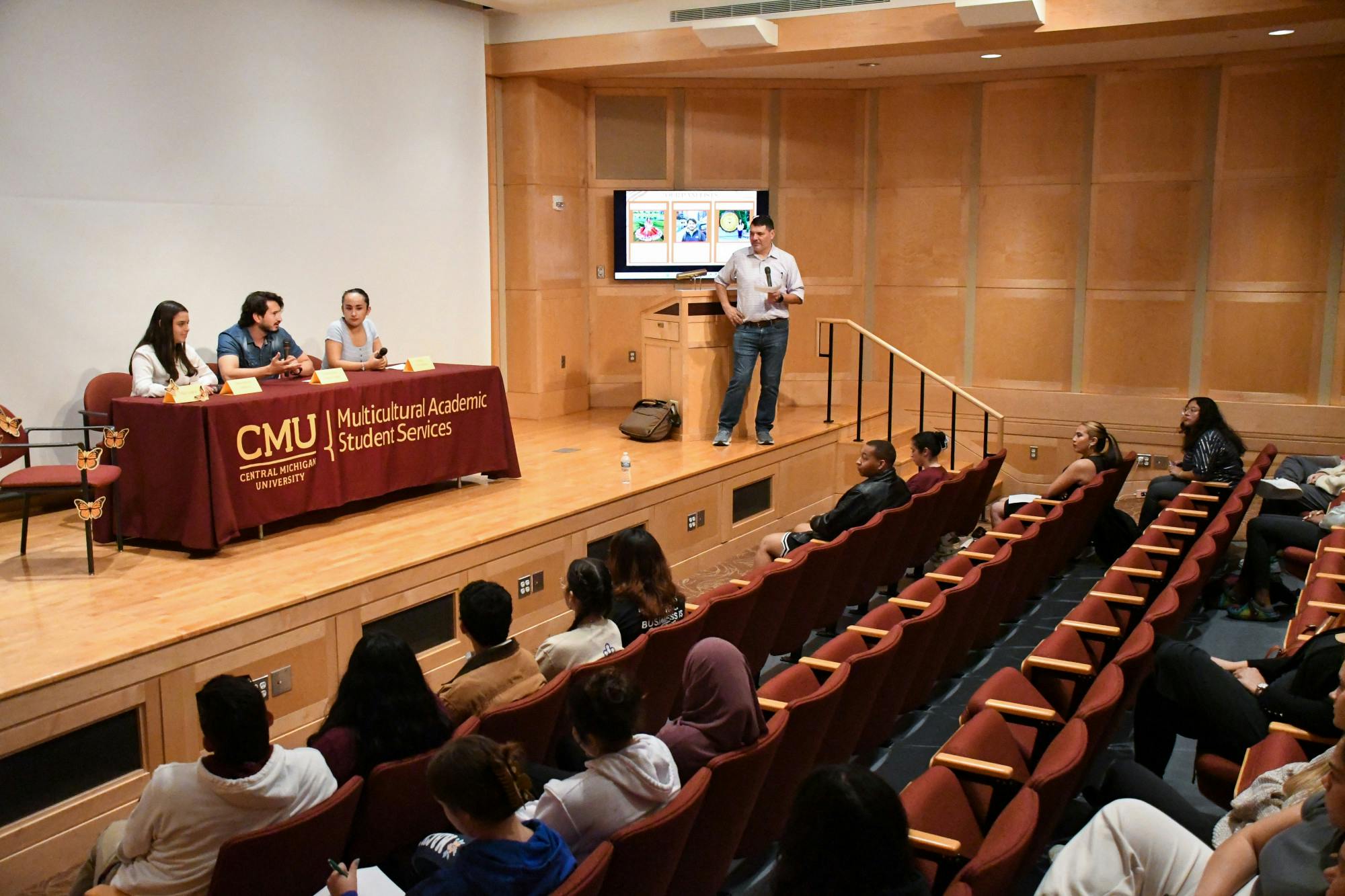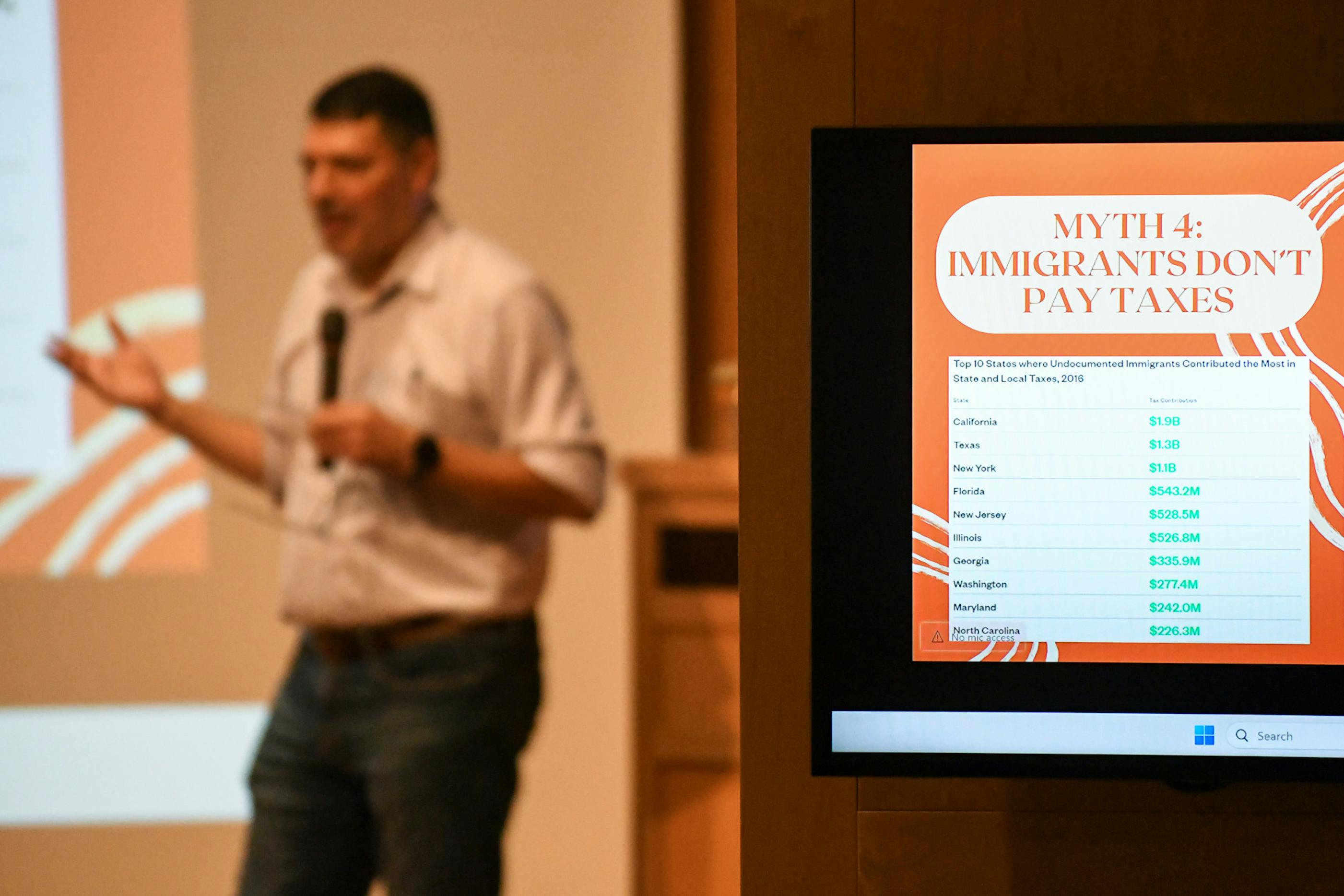'Don't call immigrants illegal': Hearing from immigrant international students

History and World Languages & Cultures professor Roberto Mendoza presents during Empowering Immigrant and Undocumented Students in Higher Education, Tuesday, Sept. 26 in Sarah Opperman Auditorium. "You dehumanize people by calling them illegal," Mendoza said, saying to use the term undocumented instead.
Central Michigan University enrolls students from all across the country, and even the world. Frida Ferrusquia, Carlos Lopez and Elissa Melhem come from different parts of Latin America with different cultures, languages and lifestyles, but they all took the opportunity to share their stories as international immigrant students at CMU.
Multicultural Acedemic Students Services hosted “Empowering Immigrants and Undocumented Students in Higher Education” in the Sarah Opperman Auditorium in the Park Library.
About 80 attendees filled in the auditorium on Sept. 26, listening to the Empowering Immigrants and Undocumented Students in Higher Education event.
“People (tell) immigrants to just apply for a visa or permanent permit to work in the United States,” Roberto Mendoza, a professor in the Department of History, World Languages and Cultures, said, “If you’re in the country or outside the country it can take up to 10 to 20 years. You can die while waiting for a visa.”

Medellín, Colombia Ph. D. student Carlos Mario Cuervo Lopez speaks during Empowering Immigrant and Undocumented Students in Higher Education, Tuesday, Sept. 26 in Sarah Opperman Auditorium. Cuervo Lopez came to CMU in 2021, and spoke about his experiences navigating college during the Covid pandemic.
Mendoza talked about many misconceptions that Latino and Hispanic people face in the United States, myths about Latinos, what it means to be Hispanic and his own heritage.
“There are a lot of Latinos in the US," he said. "More people speak Spanish in the U.S. than in Spain or Argentina or Chile or Columbia. This is not because they are all immigrants. Most immigrants in the US, not just Latinos … are here legally … and one thing I emphasize in my courses all the time is ‘Don’t call immigrants illegal.’"
“Maybe they crossed the border or overstayed their visa illegally, but they are just undocumented immigrants. We shouldn't dehumanize people by calling them illegal. They are undocumented.”
Maureen Belcher, a Multicultural Advancement (MAC) scholar, said she attended the event because she's Mexican.
"I wanted to learn more about my culture since I didn't grow up around it," Belcher said.

History and World Languages & Cultures professor Roberto Mendoza debunks the myth that immigrants don't pay taxes during Empowering Immigrant and Undocumented Students in Higher Education, Tuesday, Sept. 26 in Sarah Opperman Auditorium. Mendoza stated that undocumented people pay $20 billion per year in federal taxes.
The three panel speakers; Ferrusquia, Lopez and Melhem spoke about coming to the U.S for an education, how being an immigrant student shaped their life and how people can help immigrants transition into living in the U.S.
Ferrusquia is from Mexico and left four years ago to come to the United States to be able to study dietetics and Spanish. She talked about how English is different than what she is used to.
“The most stressful part (is) that everyone else is on that level and you are not," Ferrusquia said. "In my English class my professor would (say) ‘your papers are not as good’ and yes because my English is not as good as everyone else in the class."
Lopez is a doctoral student from Columbia. He came during the COVID-19 pandemic.
Lopez said it is culturally different living in U.S. For example, he is used to close physical touch in his culture that is not same in the U.S.
Because of his accent, Lopez said "you feel like you don't belong here."
Melhem was already in an exchange program in high school in Lansing, Michigan. She is from Brazil.
The meaning of jokes can get lost in translation. Melhem said she preferred if people were understanding but still pointed it out so the mistake isn't made again.
Mendoza reached out to Empowered Latino Union (ELU) and they worked with Multicultural Academic Student Services to organize this event and have speakers to share their stories.
Lizbeth Perez, president of the ELU and the ELU E-Board found speakers they thought were best fit, finding people who would be comfortable speaking in front of people and answering questions, since some are not as open to sharing or comfortable with their accents.
”The event was to highlight people and really see what they needed, what their journeys and experiences have been, how we can do better in terms of creating a community for them and highlighting smaller issues that they didn’t feel like they had a platform for,” Perez said.



